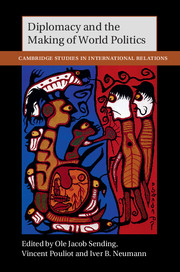Book contents
- Frontmatter
- Contents
- Contributors
- Acknowledgments
- Introduction
- Part I Making of international institutions
- Part II Making international cooperation
- 4 From representation to governing: diplomacy and the constitution of international public power
- 5 Institutionalizing peace and reconciliation diplomacy: third-party reconciliation as systems maintenance
- 6 Christian ethics, actors, and diplomacy: mediating universalist pretentions
- Part III Diplomacy as a contested terrain
- Conclusion: Relationalism or why diplomats find international relations theory strange
- Bibliography
- Index
- Cambridge Studies in International Relations
6 - Christian ethics, actors, and diplomacy: mediating universalist pretentions
from Part II - Making international cooperation
Published online by Cambridge University Press: 05 September 2015
- Frontmatter
- Contents
- Contributors
- Acknowledgments
- Introduction
- Part I Making of international institutions
- Part II Making international cooperation
- 4 From representation to governing: diplomacy and the constitution of international public power
- 5 Institutionalizing peace and reconciliation diplomacy: third-party reconciliation as systems maintenance
- 6 Christian ethics, actors, and diplomacy: mediating universalist pretentions
- Part III Diplomacy as a contested terrain
- Conclusion: Relationalism or why diplomats find international relations theory strange
- Bibliography
- Index
- Cambridge Studies in International Relations
Summary
Introduction
This volume explores questions regarding diplomacy's social configurations, authority structures, and modes of governance to conceptualize more clearly many of the central practices that are constitutive of international politics and provide analytical tools for examining them. As the editors point out, the idea that civil society actors have infiltrated interstate diplomacy, transforming it into something new, is important, but it does not tell the whole story of diplomatic interactions and their complexity in the present day (see Introduction). As a result, a relational approach is needed, one that does not eliminate conventional state representatives in diplomatic stories but rather understands them as embedded in new forms of interaction with other, non-state actors and both territorial and de-territorialized spaces of governance.
My previous work addressed this conundrum (Beyond Appeasement, 1999), although it did not use all of these terms. Looking at the role of peace movements in a time (the 1920s and 1930s) when conventional diplomats openly disdained attempts by civil society actors to influence both bilateral and multilateral arms control and arbitration agreements, I argued, was critical for understanding important normative changes in global governance and the delegitimization of traditional forms of diplomatic practice. The relationality among conventional diplomats and social forces (who were frequently not united in their demands), against a background in which the knowledge of the state and the expertise of diplomats as well as other officials were widely and publicly questioned, resulted in significant changes in authority structures and modes of governance. These changes resulted in legitimizing and institutionalizing global international organization, from the League of Nations to the United Nations, not as a space in which negotiations and treaties occurred in settled or technocratic fashion, but rather as a space of contestation and debate for the relations between “new” and “old” actors, representing a wide range of ideas and interpretations of what was necessary in global politics.
- Type
- Chapter
- Information
- Diplomacy and the Making of World Politics , pp. 168 - 192Publisher: Cambridge University PressPrint publication year: 2015
- 3
- Cited by



